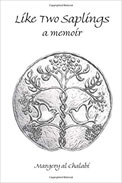
 |
Just short of their forty-ninth wedding anniversary on March 9, 2014, Margery and Suhail al Chalabi received dire information: Suhail's "chronic leukemia had become acute. Not only acute, but developed into a far-more lethal strain – BPDCN – a set of letters that would become terrifying" for them. This memoir relates the journey the couple undergoes as they deal with Suhail's struggle with blastic plasmacytoid dendritic cell neoplasm. It is also the story of the couple's half-century together. Margery's tribute to her partner of fifty-plus years is a testament to their strong marriage. Told through Margery's point of view, it is the story of the deep love and pride she feels for the husband with whom she shared most of her life as well as her determination to ensure his accomplishments not be forgotten.
Suhail was born into a prominent Iraqi family in Baghdad in 1940. After attending MIT, where he received a degree in architecture, he went to Athens Technological Institute in Greece to pursue a postgraduate degree in urban planning and regional economics, earning his master's degree in 1965. It was there he met Margery, an architecture major from Carnegie Mellon. The two were married and returned to the United States to settle in Chicago in 1965, where his work garnered him a reputation that led to his being recruited to work as a special assistant in the office of Mayor Jane M. Byrne in 1980. Margery was also asked to assist her husband on a ten-year capital budget and transportation plan to support Chicago's effort in winning the 1992 World's Fair. When Byrne lost reelection, the husband and wife team started their own firm, ACG (AL Chalabi Group), in which an early project was saving, purchasing, and rehabilitating the Chicago Theater. Though ACG found itself in a contentious relationship with future administrations, the company continued to work and consult in the Chicago area to improve and enhance its infrastructure.
This memoir takes the reader from present to past in a seamless ebb and flow of the author's emotional trial of dealing with her husband's devastating disease and her look back at their long life together. It is heartbreaking at times to read of the struggles with which this brilliant couple is faced as they maneuver the ups and downs of chemotherapy. However, there is beauty in their devotion to each other. Al Chalabi writes of her husband with an admiration that is genuine. Her dedication to not only his comfort but also to his professional reputation is laudable. She fights for him on every level. Not only is her respect and love of Suhail front and center in her work, but the love they share of their chosen home, Chicago, and their numerous friends is also apparent. In turn, she describes their second home in Beverly Shores and its peaceful country setting with its abundant wildlife in endearing terms. Clearly, the author looks back on her life with her husband as ideal. This is one of those books that makes one wish its subject could have been a friend. The author indeed writes a beautiful testament to a life well-lived. She immortalizes her husband and their marriage and shows them "supporting and complementing one another like two saplings fused into a tall old tree."